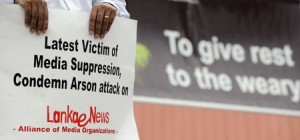Censored Website Editor Talks about Media Control in Sri Lanka
by Sampsonia Way / October 29, 2011 / No comments
Two Sri Lankan Internet Service Providers blocked access to the independent news website Lanka-e-News. “This decision by Sri Lanka Telecom (SLT) and Dialog Axiata PLC to block the Lanka-e-News site reflects the increase in censorship in Sri Lanka,” Reporters Without Borders said. “We urge these ISPs not to discriminate against news sites that are critical of the government and to restore access to Lanka-e-News. The government must also stop pressuring ISPs and guarantee their independence.”
The hounding of Lanka-e-News has intensified this year. An arson attack on its headquarters in the Colombo suburb of Malabe in the early hours of 31 January gutted most of the building including the rooms housing its computers and library and forced it to suspend all activities.
The Lanka-e-News political journalist and cartoonist Prageeth Eknaligoda is meanwhile still missing. He disappeared on 24 January 2010 (See the support campaign).
Several other sites, including the Sri Lanka Guardian, are permanently blocked. Groundviews and its partner site Vikalpa were temporarily blocked on 20 June, like the Transparency International site.
Lanka-e-News editor Sandaruwan Senadheera, who fled into exile a year ago, has been interviewed by Reporters Without Borders about the current state of media freedom and freedom of information in Sri Lanka:
Why is Lanka-e-News (LeN) so important, what makes it different from other websites in Sri Lanka?
The media are under a lot of pressure at the moment in Sri Lanka. All electronic media require an annually renewable government license, so it’s as if the media were under the government’s control. It’s at a time like this that LeN is most important to the people in Sri Lanka. LeN was the first Sinhalese online media and we were the first to use the Sinhala language correctly in html. One of the main differences is that, unlike other websites in Sri Lanka, LeN is subject to zero influence from the government or any other political bodies.
Why are the media not free? Can you give examples?
The Rajapakse regime has been more hostile to journalists than any other government since independence in 1948. It is involved in a lot of corruption and it abuses its power to ensure that the word does not get out about its corruption. In the latest example, the chairman of the television channel TNL, Shaan Wickramasinghe, received death threats because he revealed the government’s corrupt involvement in the Sri Lankan share market.
Have there been any changes since the official end of the war in 2009?
There has been a change. Media freedom has gone from bad to worse. The biggest exodus of journalists has been since the end of the war.
Since the torching and closure of LeN’s office, the number of volunteer journalists and informants has increased dramatically. Before there were only four journalists working openly at LeN but now the numbers have increased tenfold and the number of informants have increased a hundredfold. This proves that Sri Lankans are in dire need of access to truthful information.
What about print media, some, like Uthayan, are still operating, aren’t they?
Right, Uthayan is an independent newspaper but the journalists who work there receive a lot of threats.
What can you tell us about Prageeth Ekneligoda, the LeN cartoonist and journalist?
The media minister at the time of Prageeth’s disappearance, Lakshman Yapa Abeywardana, personally told LeN that we would receive good news about Prageeth “within a week.” This is clear evidence that the government was involved in his disappearance.
What is needed to improve the situation of press freedom in Sri Lanka?
I think that the Constitution’s cancelled 17th amendment [envisaging the creation of an independent electoral commission to guarantee electoral transparency] needs to be reintroduced not only to bring back press freedom but also for democracy, law and order, and justice in Sri Lanka. The international community needs to exert greater pressure than just stopping [Sri Lanka’s benefits under the Generalised System of Preferences Plus]. In fact the international community has a big responsibility in this aspect.
This interview was originally published in Reporters without Borders





